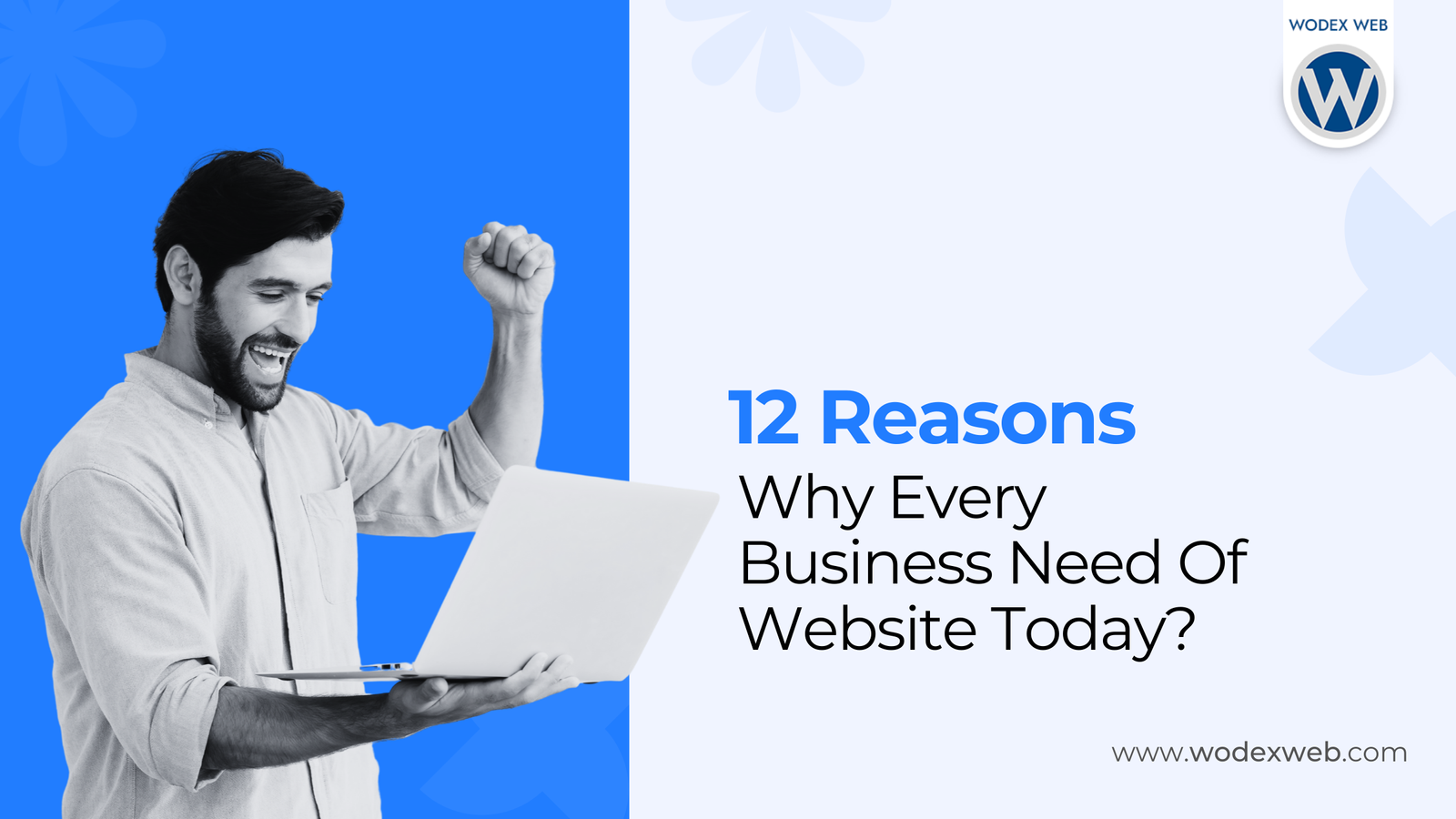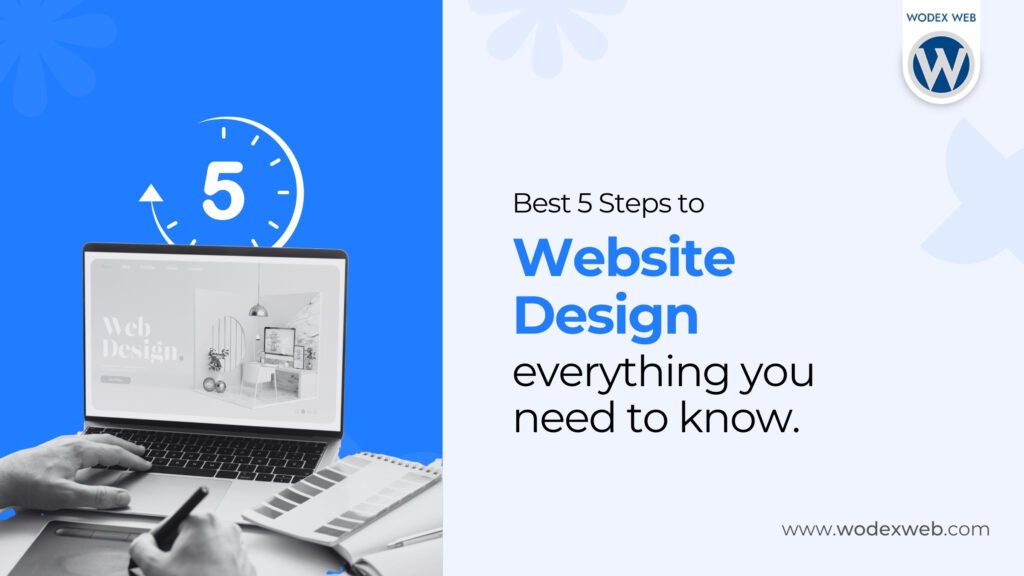Introduction
In today’s digital age, the need of website is no longer a luxury—it’s a necessity. Whether you run a small local shop, a growing startup, or a large enterprise, recognizing the need of website can significantly impact your success. With more consumers turning to the internet for information, shopping, and services, the need of website has never been more crucial for businesses looking to establish credibility, attract customers, and drive growth.
A website acts as your digital storefront, open 24/7, allowing potential customers to learn about your products or services anytime. The need of website is evident in how it enables you to showcase your brand, build trust, and engage with your audience through valuable content. Additionally, the need of website becomes even more apparent in a competitive market, helping you stay ahead of competitors who are already leveraging online platforms.
If you’re still on the fence about the need of website for your business, here are 12 compelling reasons why you should build one today. The need of website is especially critical for increasing sales, improving customer engagement, and enhancing brand visibility. Ignoring the need of website can put your business at a disadvantage, while embracing it can be a game-changer in achieving your business goals.
Businesses of all sizes should understand the need of website in today’s digital world. The need of website applies to industries across the board, from retail and hospitality to professional services and e-commerce. No matter what sector you operate in, the need of website cannot be overstated.
Ultimately, the need of website is about providing value to your customers, ensuring accessibility, and staying relevant in an ever-evolving marketplace. The need of website should be at the forefront of your business strategy, helping you reach a wider audience and make a lasting impact. Now, let’s explore the top reasons why the need of website is essential for your business success today.
1.Credibility and Professionalism
- A well-designed website adds credibility and makes your business appear more legitimate and professional. Customers expect businesses to have an online presence, and without one, they may question your reliability.
- A professional website conveys trustworthiness and expertise in your industry. It provides potential customers with essential information about your products, services, and company values. A well-structured site with clear branding, high-quality visuals, and user-friendly navigation enhances the user experience, making visitors more likely to engage with your business.
- Additionally, customer testimonials, case studies, and professional certifications displayed on your website further reinforce credibility. A strong online presence also improves search engine rankings, making it easier for new customers to find your business. Investing in a well-crafted website demonstrates commitment to quality and customer satisfaction, setting you apart from competitors.
2. 24/7 Availability

- Unlike a physical store with set hours, a website is open 24/7. This means customers can browse your products or services, make purchases, and contact you at any time, regardless of their location or time zone. This not only enhances convenience but also maximizes sales opportunities.
- Additionally, an always-accessible website helps businesses cater to different customer preferences, such as night owls or international buyers. Automated chat support, FAQs, and self-service options can further improve customer experience, ensuring they get the information they need even outside regular business hours.
3.Increased Visibility
- With billions of people using the internet daily, having a website ensures that your business can be found through search engines. Without a website, potential customers searching for businesses like yours may never find you.
- A well-optimized website increases your chances of appearing in search engine results, making it easier for customers to discover your products or services. By implementing search engine optimization (SEO) strategies, such as using relevant keywords, creating high-quality content, and optimizing page speed, you can enhance your online presence and attract more visitors.
- Additionally, a website allows your business to be visible 24/7, unlike physical stores with limited operating hours. Customers can learn about your offerings, browse your products, and contact you at their convenience. Having an online presence also helps you reach a global audience, expanding your market beyond local boundaries.
- Moreover, integrating social media, blog posts, and customer reviews on your website can further boost your visibility. A strong digital presence not only increases brand awareness but also establishes credibility and trust among potential customers.
4.Cost-Effective Marketing
- Compared to traditional advertising methods like print, TV, or radio ads, a website is a highly cost-effective way to market your business. It serves as a 24/7 digital storefront, allowing potential customers to access information about your products and services at any time.
- By leveraging Search Engine Optimization (SEO), you can increase your website’s visibility on search engines like Google, bringing in organic traffic without the recurring costs of paid advertisements. Social media integration enables you to reach a broader audience by sharing your website’s content on platforms like Facebook, Instagram, LinkedIn, and Twitter, driving more engagement and potential leads.
- Additionally, content marketing—such as blogging, videos, infographics, and email newsletters—helps establish your brand as an authority in your industry. These strategies not only boost your online presence but also create long-term value by attracting and retaining customers without a hefty advertising budget.
- With analytics tools, you can track the effectiveness of your marketing efforts, refine your strategies, and maximize your return on investment (ROI). Ultimately, having a well-optimized website empowers businesses to grow efficiently while keeping marketing costs low.
5. Better Customer Engagement
A website allows direct interaction with your customers through various features such as blogs, FAQs, live chat, and contact forms. These tools enhance communication, provide instant support, and help businesses address customer needs effectively.
- Blogs: Regular blog posts keep your audience informed about industry trends, product updates, and company news, fostering trust and credibility.
- FAQs: A well-organized FAQ section answers common queries, reducing customer frustration and saving time for both users and support teams.
- Live Chat: Instant messaging enables real-time assistance, improving user satisfaction and increasing the chances of converting visitors into loyal customers.
- Contact Forms: Easy-to-use forms allow customers to reach out with inquiries, feedback, or support requests, ensuring a seamless communication experience.
Additionally, integrating social media links, personalized recommendations, and user reviews further enhances customer engagement. By providing multiple channels for interaction, businesses can create a more customer-centric approach, build long-term relationships, and improve overall customer satisfaction.
6. Showcase Your Products & Services
A website is the perfect place to display your products and services in detail. It acts as a digital storefront, allowing potential customers to explore what you have to offer at their convenience.
- High-Quality Images & Videos :- Visual content plays a crucial role in attracting customers. By including high-resolution images and engaging videos, you can showcase your products in the best light. Consider adding 360-degree views, product demonstrations, or even tutorial videos to provide a comprehensive understanding of your offerings.
- Detailed Descriptions:-A well-written product description can make a big difference in a customer’s buying decision. Highlight key features, specifications, benefits, and unique selling points. Use engaging and persuasive language to appeal to your target audience.
- Pricing & Customization Options:-Clearly displaying pricing information ensures transparency and builds trust. If applicable, offer customization options or package deals to cater to different customer needs. Including promotions, discounts, or limited-time offers can also encourage conversions.
- Customer Reviews & Testimonials :- Positive reviews and testimonials act as social proof, reassuring potential buyers of the quality of your products and services. Showcase real customer feedback, ratings, and success stories to build credibility. You can also feature case studies or before-and-after results to demonstrate effectiveness.
- Comparison & Buying Guides :- If you offer multiple products or services, providing comparison charts or buying guides can help customers make an informed decision. Highlight the differences between various options and recommend the best choice based on their needs.
- Call to Action (CTA) :- Encourage potential customers to take the next step by including clear and compelling CTAs. Phrases like “Buy Now,” “Get a Free Quote,” or “Schedule a Consultation” can drive engagement and increase conversions. By optimizing your website to effectively showcase your products and services, you create an engaging and informative experience that boosts sales and strengthens your brand.
7. Competitive Advantage
- In today’s digital landscape, having a website is no longer optional—it’s a necessity. Your competitors likely have websites, and if you don’t, you’re already at a disadvantage. A well-designed and optimized website provides a competitive edge by:
- Expanding Your Reach: Unlike traditional brick-and-mortar stores, a website allows you to connect with potential customers beyond your local area. You can attract visitors from different cities, states, or even countries, helping you grow your market share.
- Enhancing Credibility: A professional website builds trust with potential customers. When people search for products or services, they expect businesses to have an online presence. Without one, you risk losing credibility and customers to competitors who appear more established.
- Providing 24/7 Availability: Unlike physical stores with set hours, a website is always open. Customers can browse your products, learn about your services, and make purchases at any time of the day or night, leading to increased sales and customer engagement.
- Leveraging Digital Marketing: A website is the foundation of digital marketing strategies, including SEO, content marketing, and paid advertising. These tactics help you attract targeted traffic, generate leads, and convert visitors into loyal customers.
- Showcasing Unique Selling Points: Your website allows you to highlight what makes your business different from the competition. Whether it’s superior customer service, exclusive offers, or innovative products, your online presence helps you communicate your value proposition effectively.
8. Improved Customer Support
- A well-structured website can significantly enhance customer support by providing multiple self-service options.
- FAQ Section: A comprehensive FAQ section addresses common customer queries, such as pricing, shipping, return policies, and troubleshooting. This allows customers to find quick answers without waiting for a response.
- Live Chat: Offering live chat support ensures real-time assistance for customers who need immediate help. It improves engagement and increases the chances of converting potential buyers into loyal customers.
- Chatbots: AI-powered chatbots can handle repetitive inquiries, provide product recommendations, and even guide users through the purchasing process. This reduces response times and helps free up human agents for more complex issues.
- Help Center & Tutorials: A dedicated help center with detailed guides, video tutorials, and step-by-step instructions can empower customers to resolve issues on their own.
- Multichannel Support: Integrating customer support across various channels like email, social media, and phone ensures accessibility and convenience for different customer preferences.
- By implementing these support features, businesses can enhance user experience, boost customer satisfaction, and reduce the workload on their support teams, leading to increased efficiency and customer retention.
9. Data Collection & Analytics
- A website provides valuable insights into customer behavior, demographics, and preferences. Using tools like Google Analytics, you can track visitor activity, measure performance, and refine your marketing strategies accordingly.
- With data analytics, businesses can:
- Monitor User Behavior: Track page views, time spent on pages, bounce rates, and navigation patterns to understand customer engagement.
- Identify Traffic Sources: Determine where visitors are coming from—organic search, social media, referrals, or paid ads—to optimize marketing efforts.
- Customer Segmentation: Analyze demographics such as age, location, device usage, and interests to tailor products and services to specific audience groups.
- Conversion Tracking: Measure how well your website turns visitors into leads or customers by tracking form submissions, purchases, and sign-ups.
- A/B Testing: Compare different website layouts, content, and CTAs to determine what resonates best with your audience.
- Predictive Analytics: Use AI-driven insights to forecast trends and make data-driven decisions for future growth.
- By leveraging these analytical tools, businesses can optimize their website performance, enhance customer experience, and boost conversions effectively.
10. E-commerce Opportunities
- If you sell products, having an online store allows you to reach a global audience, increase sales, and provide seamless shopping experiences with secure payment options and order tracking. An e-commerce platform enables businesses to operate 24/7, reducing the limitations of traditional brick-and-mortar stores.
- Additionally, integrating features like personalized recommendations, customer reviews, and AI-driven chat support can enhance user experience and boost conversion rates. Marketing strategies such as SEO, social media advertising, and email campaigns can further expand your reach.
- Offering multiple payment gateways, easy return policies, and fast shipping options can increase customer trust and loyalty. Leveraging data analytics also allows businesses to track customer behavior and optimize product offerings, leading to higher profitability and long-term growth.
11. Brand Building & Awareness
- Your website is a central hub for your branding efforts. It serves as a digital storefront where customers can learn about your business, understand your values, and engage with your brand. A well-designed website not only reinforces your identity but also helps build trust and credibility with your audience.
- Key Elements of Brand Building Through Your Website:
- Consistent Branding – Your website should feature a cohesive color scheme, logo placement, typography, and design elements that align with your brand identity.
- Compelling Storytelling – Share your brand’s mission, vision, and values through engaging content. Tell your story in a way that connects emotionally with your audience.
- Unique Value Proposition (UVP) – Clearly highlight what sets your business apart from competitors and why customers should choose you.
- High-Quality Visuals – Use professional images, graphics, and videos that reflect the essence of your brand and create a lasting impression.
- Engaging Content – Provide informative blog posts, case studies, testimonials, and other valuable content to establish authority and thought leadership.
- Social Proof & Testimonials – Showcase customer reviews, success stories, and partnerships to enhance credibility.
- SEO Optimization – Ensure your website is optimized for search engines, making it easier for potential customers to find you and recognize your brand.
- Consistent Messaging – Maintain a consistent tone and voice in your website copy to reinforce your brand personality.
- Call-to-Action (CTA) – Encourage visitors to take action by including clear and compelling CTAs that align with your brand’s goals (e.g., “Get Started,” “Contact Us,” or “Learn More”).
- Integration with Social Media – Link your website to your social media profiles to create a unified brand presence across multiple platforms.
- By focusing on these key elements, your website can effectively serve as a powerful branding tool, leaving a memorable impact on visitors and helping your business grow.
12. Adaptability to Market Trends
- Consumer behavior is constantly evolving, and a website allows your business to stay adaptable. You can update content, launch new products, and implement the latest digital trends to stay ahead of the competition.
- Additionally, having a dynamic online presence enables you to analyze customer preferences through data analytics, refine marketing strategies, and quickly respond to market demands. By staying agile, your business can enhance customer engagement, optimize user experience, and maintain a competitive edge in an ever-changing digital landscape.
- AI-driven personalization enables businesses to tailor content, recommendations, and marketing for individual customers. Integrating e-commerce, social media trends, and mobile responsiveness enhances user experience. Emerging technologies like AR, VR, and chatbots create immersive interactions, driving engagement, conversions, and loyalty.
- Staying ahead in market trends requires continuous monitoring of industry shifts, competitor strategies, and technological advancements. A well-maintained website serves as a powerful tool for brand innovation, ensuring your business remains relevant and influential in the digital marketplace.
Final Thoughts:- A website is more than just an online address—it’s a powerful tool that can help grow your business, attract customers, and enhance your brand reputation. If you don’t have one yet, now is the time to invest in a website and take your business to the next level.
Conclusion
In today’s fast-paced digital world, the need of website is more important than ever. A business without an online presence misses out on countless opportunities for growth, brand recognition, and customer engagement. Understanding the need of website is essential for businesses looking to stay ahead in a competitive market. A website acts as a digital storefront, open 24/7, providing potential clients with easy access to information, products, and services.
The need of website stems from evolving consumer behavior. People rely on online searches before making purchasing decisions, and businesses that acknowledge the need of website can capture this audience. A well-designed website enhances credibility, builds trust, and positions a company as a professional entity. The need of website also extends to digital marketing efforts, allowing businesses to implement SEO strategies, drive organic traffic, and rank higher in search results.
A strong online presence fulfills the need of website by increasing visibility and customer engagement. Companies that recognize the need of website can showcase their expertise, display customer testimonials, and provide real-time updates on their offerings. The need of website is not limited to e-commerce businesses; service providers, local businesses, and professionals must also meet the need of website to attract clients and establish their authority in the industry.
Moreover, the need of website plays a crucial role in streamlining business operations. Features like online booking, automated inquiries, live chat support, and e-commerce functionality cater to modern consumer demands. Businesses that understand the need of website can offer seamless customer experiences, making interactions smooth and hassle-free. Acknowledging the need of website helps organizations improve communication, build customer relationships, and boost conversion rates.
Another major factor contributing to the need of website is the rise of digital marketing. Companies leveraging social media integration, content marketing, and email campaigns benefit from greater outreach and engagement. Without meeting the need of website, businesses risk falling behind competitors who use digital tools to connect with audiences. The need of website also enables businesses to analyze visitor behavior, track performance, and make data-driven improvements.
The need of website is universal—whether you’re a startup looking to establish your brand or an established company aiming to expand, having an online presence is a necessity. Ignoring the need of website means losing potential leads, reducing customer trust, and missing out on lucrative market opportunities. Companies that embrace the need of website create a lasting impact, ensuring long-term success in their respective industries.
In the modern era, the need of website is undeniable. No matter the business size or sector, the need of website cannot be overlooked. The longer a company delays recognizing the need of website, the more it risks losing customers to competitors with a strong digital presence. Meeting the need of website is the key to unlocking endless growth opportunities.
Don’t wait any longer—acknowledge the need of website today and take the first step toward digital success!











